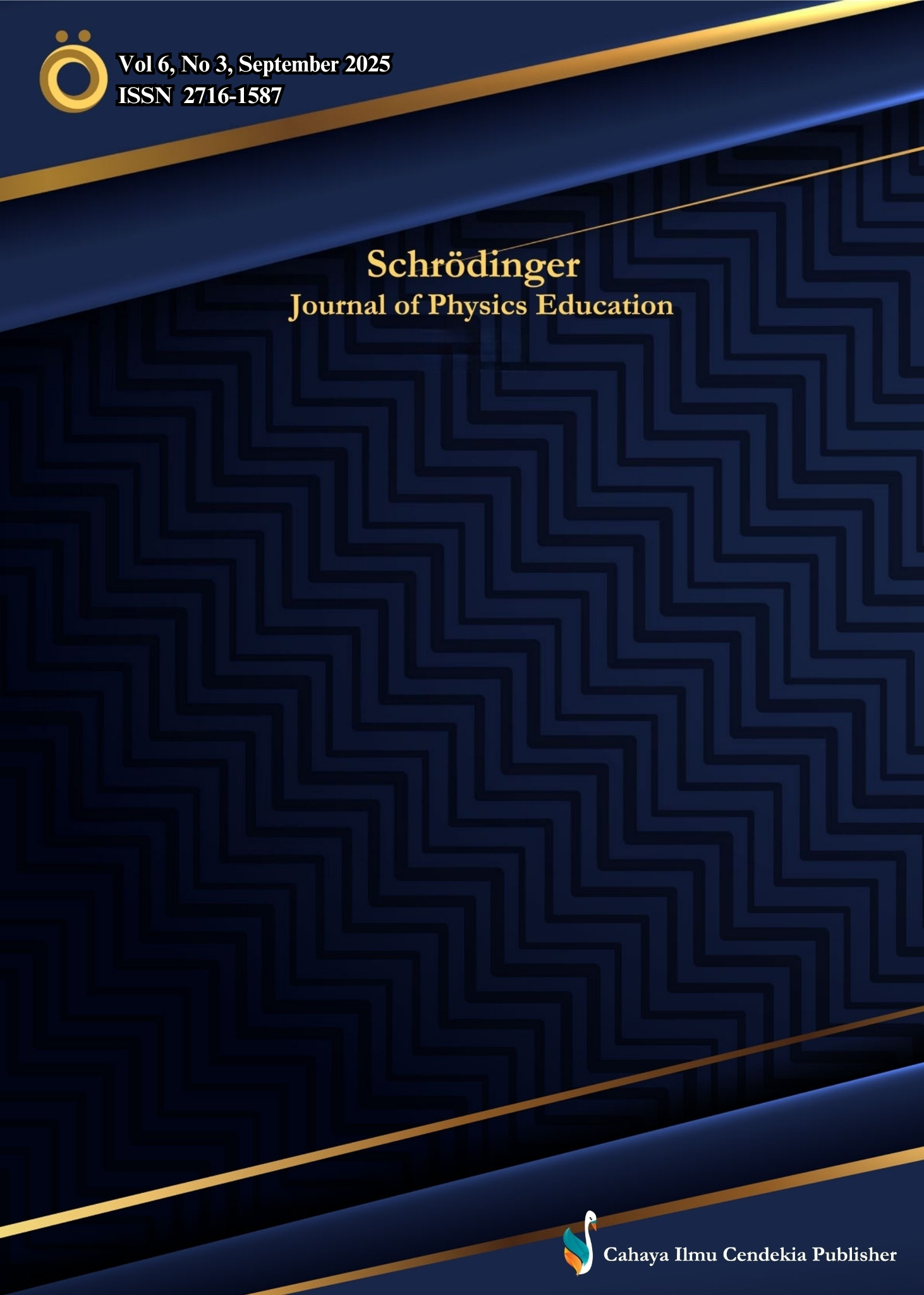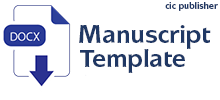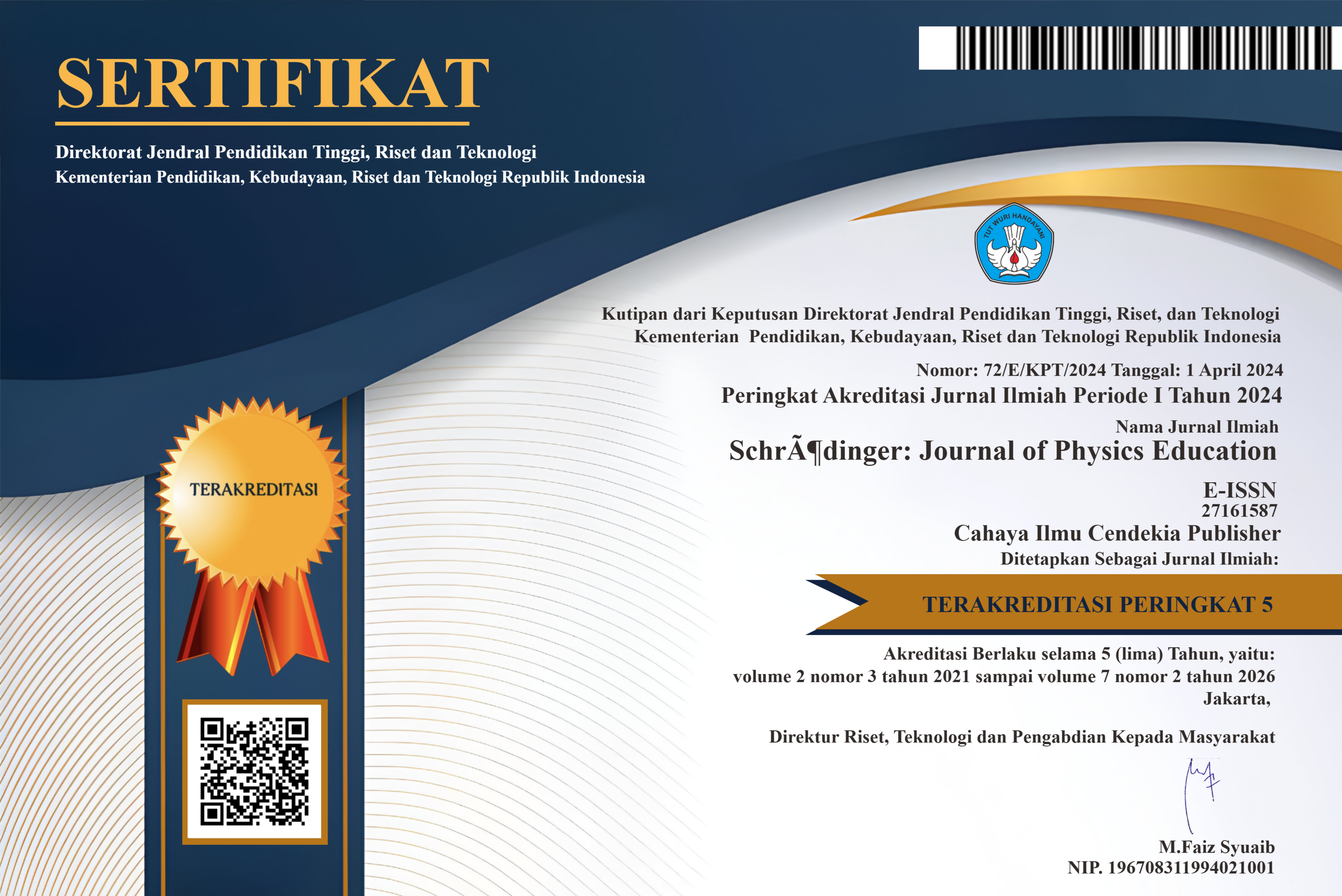Artificial Intelligence for Physics Education in STEM Classrooms: A Narrative Review within a Pedagogy Technology Policy Framework
Abstract
Purpose of the study: This study seeks to consolidate existing global research on the incorporation of Artificial Intelligence (AI) into school-level STEM education, with a particular emphasis on physics teaching and learning in primary and secondary settings, to delineate principal trends, recognize emerging opportunities, and underscore ongoing challenges in pedagogy and learning.
Methodology: A narrative literature review was performed utilizing Google Scholar and Scopus to identify significant studies published from 2015 to 2025. The selection emphasized peer-reviewed journal articles and conference proceedings that concentrate on the pedagogical, technological, and policy aspects of AI in STEM education.
Main Findings: The analysis indicates that artificial intelligence is transforming STEM education via intelligent tutoring systems, adaptive learning platforms, automated assessments, and virtual laboratories. These technologies improve personalization, engagement, and inquiry-based learning, yet they also present ethical dilemmas concerning bias, privacy, and equity. A novel conceptual framework that integrates pedagogy, technology, and policies is proposed to direct future research and practice.
Novelty/Originality of this study: This study presents a novel three-dimensional framework that interconnects pedagogy, technology, and policy as mutually reinforcing components in AI-enhanced STEM education. The model presents a novel analytical framework for assessing existing initiatives and outlines a strategy for creating inclusive and sustainable AI-enhanced learning environments.
References
S. C. Kong, H. Ogata, J.-L. Shih, and G. Biswas, "The role of artificial intelligence in STEM education," in Proc. 29th Int. Conf. Comput. Educ. (ICCE), vol. II, 2021, pp. 774–776. [Online]. Available: https://library.apsce.net/index.php/ICCE/article/view/4336
[2] M. J. Reiss, "The use of AI in education: Practicalities and ethical considerations," London Rev. Educ., vol. 19, no. 1, p. 5, 2021, doi: 10.14324/LRE.19.1.05.
S. Feng, A. J. Magana, and D. Kao, "A systematic review of literature on the effectiveness of intelligent tutoring systems in STEM," in 2021 IEEE Frontiers Educ. Conf. (FIE), 2021, doi: 10.1109/FIE49875.2021.9637240.
D. Sun, G. Cheng, P. L. H. Yu, J. Jia, Z. Zheng, and A. Chen, "Personalized STEM education empowered by artificial intelligence: A comprehensive review and content analysis," Interact. Learn. Environ., pp. 4419–4441, 2025, doi: 10.1080/10494820.2025.2462156.
B. K. Nagaraj, A. Kalaivani, S. R. Begum, S. Akila, H. K. Sachdev, and N. Senthil Kumar, "The emerging role of artificial intelligence in STEM higher education: A critical review," Int. Res. J. Multidisciplinary Technovation, vol. 5, no. 5, pp. 1–19, 2023, doi: 10.54392/irjmt2351.
L. Gavrilas and K. T. Kotsis, "The evolution of STEM education and the transition to STEAM/STREAM," Aquademia, vol. 9, no. 1, p. ep25002, 2025, doi: 10.29333/aquademia/16313.
L. Gavrilas and K. T. Kotsis, "Integrating learning theories and innovative pedagogies in STEM education: a comprehensive review," Eurasian J. Sci. Environ. Educ., vol. 5, no. 1, pp. 11–17, 2025, doi: 10.30935/ejsee/16538.
V. Samara and K. T. Kotsis, "The use of STEM as a tool for teaching the concept of magnetism in kindergarten," J. Res. Environ. Sci. Educ., vol. 2, no. 1, pp. 1–17, 2025, doi: 10.70232/jrese.v2i1.1.
V. Samara and K. T. Kotsis, "The use of new technologies and robotics (STEM) in the teaching of sciences in primary education: The concept of magnetism: a bibliographic review," Eur. J. Educ. Stud., vol. 10, no. 2, pp. 51–64, 2023, doi: 10.46827/ejes.v10i2.4652.
L. Gavrilas and K. T. Kotsis, "Investigating perceptions of primary and preschool educators regarding incorporation of educational robotics into STEM education," Contemp. Math. Sci. Educ., vol. 5, no. 1, p. ep24003, 2024, doi: 10.30935/conmaths/14384.
L. Gavrilas and K. T. Kotsis, "A theoretical framework for the effective STEM educator: Integrating literacy, knowledge, collaboration, and self-efficacy," J. Math. Sci. Teacher, vol. 5, no. 4, p. em085, 2025, doi: 10.29333/mathsciteacher/16857.
V. Samara and K. T. Kotsis, "Robotic christmas activities with beebot: a STEM application for preschool education," J. Sci. Educ. Res., vol. 7, no. 2, pp. 21–31, 2025, doi: 10.21831/jser.v9i1.77862.
V. Samara and K. T. Kotsis, "Use of artificial intelligence in teaching the concept of magnetism in preschool education," J. Digit. Educ. Technol., vol. 4, no. 2, p. ep2419, 2024, doi: 10.30935/jdet/14864.
K. T. Kotsis, "Integrating artificial intelligence in science education: benefits and challenges," Int. J. Educ. Innov., vol. 6, no. 3, pp. 39–49, 2024, doi: 10.69685/ICAS1772.
G. Vakarou, G. Stylos, and K. T. Kotsis, "AI for enhancing physics education: practical tools and lesson plans," Int. J. Sci. Math. Technol. Learn., vol. 31, no. 2, pp. 159–176, 2024, doi: 10.18848/2327-7971/CGP/v31i02/159-176.
G. Vakarou, G. Stylos, and K. T. Kotsis, "Probing students' understanding of Einsteinian physics concepts: a study in primary and secondary Greek schools," Phys. Educ., vol. 59, no. 2, p. 025004, 2024, doi: 10.1088/1361-6552/ad1768.
G. Stylos, I. Theocharis, E. Gkaltemi, D. Panagou, and K. T. Kotsis, "Exploring stereotypical perceptions of scientists among Greek primary school students: Insights from the draw-a-science-comic test," Res. Sci. Technol. Educ., pp. 1–28, 2025, doi: 10.1080/02635143.2025.2543270.
G. Stylos, E. Evangelou, V. Nousis, K. Georgopoulos, and K. T. Kotsis, "Measurement of kinetic friction coefficient using an Arduino," Int. J. Innov. Res. Sci. Eng. Technol., vol. 13, no. 7, 2024, doi: 10.15680/IJIRSET.2024.1307098.
N. Kyriazis, G. Stylos, and K. T. Kotsis, "Impact of inquiry-based laboratory activities on understanding heat concepts and self-efficacy in pre-service teachers," J. Pedagogical Res., vol. 9, no. 1, pp. 161–181, 2025, doi: 10.33902/JPR.202530426.
V. Ladas, G. Stylos, and K. T. Kotsis, "Explore the properties of sound waves by using robotics," Sci. School, vol. 73, pp. 1–14, 2025. [Online]. Available: https://scienceinschool.org/article/2025/explore-the-sound-waves-by-using-robotics/
K. T. Kotsis, "From chalkboard to chatbot: the future of physics education through artificial intelligence integration," EIKI J. Eff. Teach. Methods, vol. 3, no. 2, pp. 74–79, 2025, doi: 10.59652/jetm.v3i2.515.
K. T. Kotsis, "Artificial intelligence helps primary school teachers to plan and execute physics classroom experiments," EIKI J. Eff. Teach. Methods, vol. 2, no. 2, pp. 1–9, 2024, doi: 10.59652/jetm.v2i2.158.
O. Tuyboyov, N. Sharipova, L. Ergasheva, and S. Nasirdinova, "The role and impact of AI-enhanced virtual laboratories in mechanical engineering education," in *Proc. IV Int. Conf. Adv. Sci., Eng., Digit. Educ.: ASEDU-IV 2024*, vol. 3268, p. 070019, 2025, doi: 10.1063/5.0257378.
A. Bayaga, "Advancing STEM cognition with current AI landscape and systems," in 2024 Conf. Inf. Commun. Technol. Soc. (ICTAS), pp. 20–25, 2024, doi: 10.1109/ICTAS59620.2024.10507138.
E. Kasneci et al., "ChatGPT for good? on opportunities and challenges of large language models for education," Learn. Individ. Differ., vol. 103, p. 102274, 2023, doi: 10.1016/j.lindif.2023.102274.
J. Knox, "Artificial intelligence and education in China," Learn., Media Technol., vol. 45, no. 3, pp. 298–311, 2020, doi: 10.1080/17439884.2020.1754236.
I. U. Haq et al., "AI in the network of extended reality-enabled laboratories for STEM education: current applications and future potential for adaptive learning," in Mech. Mach. Sci.: Proc. I4SDG Workshop 2025, vol. 180, pp. 373–382, 2025, doi: 10.1007/978-3-031-91179-8_39.
M. Hakimi and A. K. Shahidzay, Transforming education with artificial intelligence: Potential and obstacles in developing countries, Preprint, 2024. doi: 10.20944/preprints202407.2542.v1.
F. Ouyang, P. Jiao, A. H. Alavi, and B. M. McLaren, "Artificial intelligence in STEM education: current developments and future considerations," in Artif. Intell. STEM Educ.: Paradigmatic Shifts Res., Educ., Technol., F. Ouyang, P. Jiao, B. M. McLaren, and A. H. Alavi, Eds. Boca Raton, FL, USA: CRC Press, 2022, pp. 1–12, doi: 10.1201/9781003181187.
W. Holmes and I. Tuomi, "State of the art and practice in AI in education," Eur. J. Educ., vol. 57, no. 4, pp. 542–570, 2022, doi: 10.1111/ejed.12533.
K. T. Kotsis, "Artificial intelligence and the scientific process: A review of ChatGPT's role to foster experimental thinking in physics education," Eur. J. Contemp. Educ. E-Learn., vol. 3, no. 3, pp. 183–198, 2025, doi: 10.59324/ejceel.2025.3(3).14.
P. Nuangchalerm and V. Prachagool, "AI-driven learning analytics in STEM education," Int. J. Res. STEM Educ., vol. 5, no. 2, pp. 77–84, 2023. [Online]. Available: https://eric.ed.gov/?id=ED634109
A. Bandura, "Social cognitive theory: an agentic perspective," Annu. Rev. Psychol., vol. 52, no. 1, pp. 1–26, 2001, doi: 10.1146/annurev.psych.52.1.1.
B. J. Zimmerman and A. R. Moylan, "Self-regulation: where metacognition and motivation intersect," in Handbook of Metacognition in Education, D. J. Hacker, J. Dunlosky, and A. C. Graesser, Eds. New York, NY, USA: Routledge, 2009, pp. 299–315, doi: 10.4324/9780203876428.
M. J. Grant and A. Booth, "A typology of reviews: an analysis of 14 review types and associated methodologies," Health Inf. Libr. J., vol. 26, no. 2, pp. 91–108, 2009, doi: 10.1111/j.1471-1842.2009.00848.x.
S. K. Boell and D. Cecez-Kecmanovic, "On being 'systematic' in literature reviews in IS," J. Inf. Technol., vol. 30, no. 2, pp. 161–173, 2015, doi: 10.1057/jit.2014.26.
K. T. Kotsis, "ChatGPT develops physics experiment worksheets for primary education teachers," Eur. J. Educ. Stud., vol. 11, no. 5, pp. 1–20, 2024, doi: 10.46827/ejes.v11i5.5274.
K. T. Kotsis, "Integrating artificial intelligence for science teaching in high school," LatIA, vol. 3, p. 89, 2025, doi: 10.62486/latia202589.
K. T. Kotsis, “Artificial intelligence as a catalyst for changes in university-level science education,” EIKI Journal of Effective Teaching Methods, vol. 3, no. 3, pp. 99–109, 2025, doi: 10.59652/jetm.v3i3.618
Copyright (c) 2025 Konstantinos T. Kotsis

This work is licensed under a Creative Commons Attribution 4.0 International License.
Authors who publish with this journal agree to the following terms:
- Authors retain copyright and acknowledge that the Schrödinger: Journal of Physics Education is the first publisher licensed under a Creative Commons Attribution 4.0 International License.
- Authors are able to enter into separate, additional contractual arrangements for the non-exclusive distribution of the journal's published version of the work (e.g., post it to an institutional repository or publish it in a book), with an acknowledgment of its initial publication in this journal.
- Authors are permitted and encouraged to post their work online (e.g., in institutional repositories or on their website) prior to and during the submission process, as it can lead to productive exchanges and earlier and greater citation of published work.







.png)
.png)








.png)
.png)
.png)







